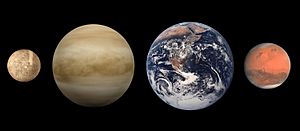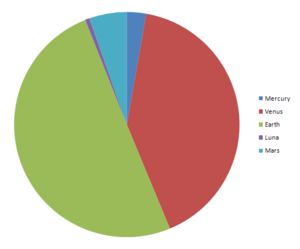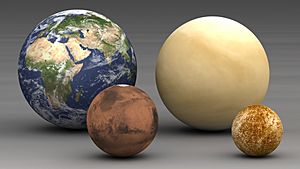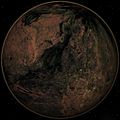Terrestrial planet facts for kids
A terrestrial planet is a planet mostly made of rock. Our Earth is a great example of a terrestrial planet. When scientists first started to understand different types of planets, they used this term for Earth and its closest rocky neighbors: Mercury, Venus, and Mars.
These planets are often said to be similar to Earth. This is true for their inside structure and what they are made of. However, their surfaces and atmospheres can be very different. A terrestrial planet might be much hotter or colder than Earth. It could also have a lot more or a lot less atmosphere.
Later, when scientists found planets orbiting other stars (called exoplanets), the term "terrestrial planet" was used again. Now, it means any rocky planet orbiting any star.
Contents
What Are Terrestrial Planets Made Of?
Layers Inside a Rocky Planet
All terrestrial planets have three main layers: a core, a mantle, and a crust. You can think of them like a hard-boiled egg!
- The central yolk is like the planet's core.
- The white part of the egg is like the mantle.
- The thin shell is like the crust.
The crust of a terrestrial planet is usually very thin. The core and mantle make up most of the planet's size. Terrestrial planets have cores made mostly of iron metal. Their mantles and crusts are made of rock.
How Atmospheres Form
Terrestrial planets have what are called secondary atmospheres. These atmospheres form over time from things like volcanism (volcanoes erupting), meteorites hitting the planet, and even photosynthesis (plants making oxygen).
Giant planets, like Jupiter, have primary atmospheres. These atmospheres were captured directly from the gas and dust cloud that formed the Solar System.
Rocky Planets in Our Solar System
Our Solar System has four main terrestrial planets: Mercury, Venus, Earth, and Mars.
Other Rocky Worlds
Our Moon is also similar in structure to a terrestrial planet, but it has a much smaller iron core. Jupiter's moons Io and Europa also have internal structures like rocky planets.
Some large asteroids, like Pallas and Vesta, are also rocky. They might have been dwarf planets a long time ago.
Icy Worlds vs. Rocky Worlds
Not all solid planets are terrestrial planets. Beyond the inner Solar System, many round bodies are called icy planets. They have a solid surface, but they are made of ice and rock, not just rock and metal.
Examples of icy dwarf planets include Ceres, Pluto, and Eris. Many other moons are also icy, like Ganymede, Callisto, Titan, and Triton.
Some of these icy worlds, like Europa and Ganymede, are thought to have oceans of liquid water hidden under their ice layers. Titan even has lakes and rivers on its surface, but they are filled with liquid methane instead of water!
Images for kids
-
Sizes of Kepler planet candidates based on 2,740 candidates orbiting 2,036 stars as of 4 November 2013 (NASA).
See also
 In Spanish: Planeta terrestre para niños
In Spanish: Planeta terrestre para niños
 | Selma Burke |
 | Pauline Powell Burns |
 | Frederick J. Brown |
 | Robert Blackburn |







